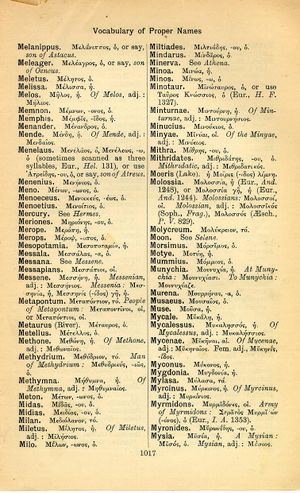Minyae: Difference between revisions
From LSJ
ἀλλ’ οὔτε πολλὰ τραύματ’ ἐν στέρνοις λαβὼν θνῄσκει τις, εἰ μὴ τέρμα συντρέχοι βίου, οὔτ’ ἐν στέγῃ τις ἥμενος παρ’ ἑστίᾳ φεύγει τι μᾶλλον τὸν πεπρωμένον μόρον → But a man will not die, even though he has been wounded repeatedly in the chest, should the appointed end of his life not have caught up with him; nor can one who sits beside his hearth at home escape his destined death any the more
(6_10) |
m (Text replacement - "]]>" to "]]") |
||
| Line 5: | Line 5: | ||
}} | }} | ||
{{Lewis | {{Lewis | ||
|lshtext=<b>Mĭnyae</b>: ārum, m., = [[Μινύαι]] | |lshtext=<b>Mĭnyae</b>: ārum, m., = [[Μινύαι]],<br /><b>I</b> the Minyans, Argonauts, the companions of [[Jason]], so called from [[their]] [[ancestor]] [[Minyas]], a [[king]] in [[Thessaly]]: [[Minyae]] dicti [[Argonautae]], [[quod]] [[plerique]] eorum ex filiis [[Minyae]] fuerant orti, Paul. ex Fest. p. 122 Müll.; Ov. M. 7, 1; cf. Hyg. Fab. 14. | ||
}} | }} | ||
Revision as of 09:29, 13 August 2017
English > Greek (Woodhouse)
Μινύαι, οἱ.
Of the Minyae, adj.: Μινύειος.
Latin > English (Lewis & Short)
Mĭnyae: ārum, m., = Μινύαι,
I the Minyans, Argonauts, the companions of Jason, so called from their ancestor Minyas, a king in Thessaly: Minyae dicti Argonautae, quod plerique eorum ex filiis Minyae fuerant orti, Paul. ex Fest. p. 122 Müll.; Ov. M. 7, 1; cf. Hyg. Fab. 14.

